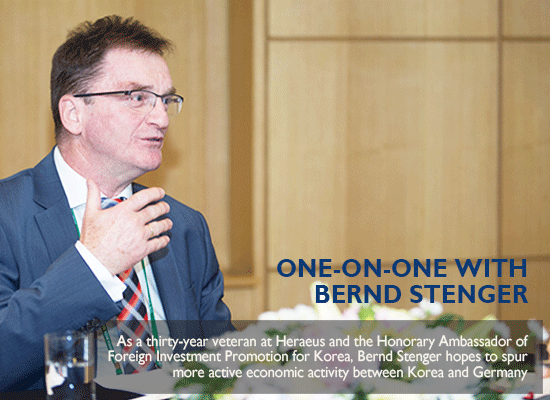Feature Stories
- Home
- Why KOREA
- Feature Stories

As a thirty-year veteran at Heraeus and the Honorary Ambassador of Foreign Investment Promotion for Korea, Bernd Stenger hopes to spur more active economic activity between Korea and Germany
Since 2011, Invest KOREA’s Honorary Ambassadors of Foreign Investment Promotion for Korea have been spreading the word about the advantages of doing business to Korea all over the world. Not only do these individuals possess vast knowledge of management and international investment, but they also have a strong business and government network in their respective countries.
Today, the honorary ambassadors inform companies and the general public about Korea’s investment opportunities in eight countries, including Germany, France, the United States and Japan.
We recently sat down with Bernd Stenger, executive vice president of marketing and sales of Germany’s Heraeus’ electronic chemicals division. Appointed as an honorary ambassador this year, Stenger sees his appointment as a chance to bring Korea and Germany even closer together. Here’s what he wants to achieve during his term.
What would you like to accomplish during your time as an honorary ambassador?
I see this role as a chance to bring German companies and Korean companies together. German companies have a strong presence in Korea, but we can do more. I want to talk to German companies that are interested in doing business in Asia and tell them about the advantages of investing in Korea. It would also be great to talk to Korean companies that want to enter the German market and give them advice. It’s important for me to foster relations in both directions.
You’ve been doing business in Korea for many years. How has Korea changed over the last decade?
A big challenge that foreign companies faced up until the last decade or so was integrating Korea’s management style with the global management structure. At that time, Korean companies operated in a hierarchical way and it was difficult to get input from people aside from senior officials. Now, things are starting to change. I think the young people here are more open and liberal. They also have more exposure to countries outside of Korea at an early age. I’m always so impressed of the endurance and stamina of the Korean people and they’re always ready to get things done. You can always trust them and rely on them. I really appreciate the fact that people respect each other and I look forward to coming to Korea each time.
What kind of investment opportunities are German companies looking for? What are some areas that could be of interest to Korean companies?
German companies are interested in industries related to semiconductors, automotive electronics, mobile phones, displays and the Internet of Things. Meanwhile, many Korean companies are showing a growing interest in German engineering and manufacturing equipment. I think that the renewable energy sector, which includes wind energy and gas turbines, can also be a newly emerging opportunity for growth.
What is some advice you would give to German companies that want to carry out operations here?
First of all, you should be prepared because Korea’s very competitive. You have to be competitive too. You can’t come here with average solutions because Korean companies have high expectations.
Also, the management style is starting to change for the better; in the past, you had to know the right person to have a chance, but now, as long as you have a good product you will be able to enter the market.
Korea is a great market for companies that want to do business not only here, but in other Asian countries like China. From my experience, Korean technology has a good reputation in China so the country could serve as an ideal gateway market.
My last advice would be to monitor Korea’s political and economic environment, but don’t be too confused by what you hear. Some people think that because of the North Korean situation, it would be risky to do business in South Korea. But don’t take this too seriously because when you’re actually in South Korea, you can see that the North Korea issue is not a threat. South Korea has a stable political and economic environment—both solid advantages of the country.
What can the Korean government do for foreign companies to make them feel more welcome?
I hope the government will continue to focus on programs that foster people’s foreign language skills so that they can better communicate with people of different cultures. I also hope that the government will inform companies early of any changes to regulations or policies so we can prepare in advance. And once the government implements these changes, it needs to make sure the policies are running smoothly and efficiently.
What are your future hopes for strengthened Korea-German relations?
The relationship between our countries is really strong and we have a lot of similarities historically. For example, Korea is divided and Germany was also once a divided country. A lot of my Korean colleagues are interested in how Germany was able to reunify successfully. I also hope to see Korea reunified because it will make the country stronger.
Korea and Germany have great relations now, but I think we need to constantly renew our commitment to each other. I would like to see Korea not lose interest in Germany and the European region. Good relationships are formed by the efforts of both sides and I will try to do my part to achieve this goal.
By Esther Oh (estheroh@kotra.or.kr)
Executive Consultant/Invest Korea










